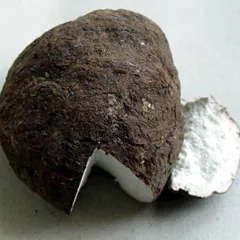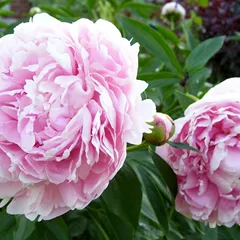Congestive heart failure according to Chinese Medicine
The information provided here is not a replacement for a doctor. You shouldn't use it for the purpose of self-diagnosing or self-medicating but rather so you can have a more informed discussion with a professional TCM practitioner.
Congestive heart failure factsheet
Possible causes and remedies:
Symptoms: Lumps Nausea Tumors and ten other symptoms
Recommended formula: Er Chen Tang and six other formulas
Spleen Deficiency with Dampness
Symptoms: Edema Diarrhea Urinary difficulty and one other symptom
Recommended formula: Wu Ling San
In Chinese Medicine, congestive heart failure can be associated with nine so-called "patterns of disharmony". Chinese Medicine sees the body as a system, not a sum of isolated parts. A "pattern" is when the system's harmony is disrupted. It is not equivalent to the Western concept of "disease", as a matter of fact here congestive heart failure can be caused by nine different patterns.
To understand whether someone's congestive heart failure might be caused by a given pattern, one needs to look for signs and symptoms associated with the pattern beyond what one might typically experience from congestive heart failure alone. For instance when congestive heart failure is caused by the pattern Phlegm, patients also experience symptoms such as feeling of oppression of the chest, muzziness of the head, dizziness and nausea. Similarly, patients with Phlegm typically exhibit slippery (Hua) or wiry (Xian) pulses as well as swollen tongue with sticky coating .
We've listed below a description of the nine patterns associated with congestive heart failure so that you can start to get an understanding of the various possibilities according to Chinese Medicine.
Once identified, patterns are often treated using herbal formulas. Drinking herbal infusions is the most common remedy in Chinese Medicine, together with acupuncture. Here we detail below five formulas that can help treat the various patterns associated with congestive heart failure, depending on which pattern fits your profile.
The nine "patterns of disharmony" associated with congestive heart failure
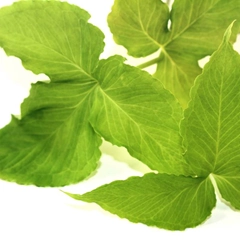
Crow-Dipper Rhizomes (Ban Xia) is the key herb for Er Chen Tang, a formula used for Phlegm
Phlegm
Pulse type(s): Slippery (Hua), Wiry (Xian)
Tongue coating: Sticky coating, Thick coating
Tongue shape: Swollen
Recommended herbal formulas: Er Chen Tang, Liu Jun Zi Tang, Ban Xia Bai Zhu Tian Ma Tang, Wen Dan Tang, Hao Qin Qing Dan Tang, Xing Su San, Wu Ling San
Symptoms: Lumps Nausea Tumors Nodules Obesity Delirium Dizziness Overweight Feeling of heaviness Muzziness of the head Numbness in the limbs Thick greasy secretions Feeling of oppression of the chest
Phlegm has a great importance in Chinese Medicine as it is both a condition in and of itself as well as a cause for other diseases.
The main cause for the formation of Phlegm is Spleen Deficiency since the Spleen rules the transformation and transportation of Body Fluids. If this function is impaired, Body Fluids accumulates and change into Phlegm.
The Lungs and Kidneys may also be involved since they each play a role in handling body Fluids: the Lungs disperse and descend Body Fluids while the Kidneys transform and excrete them. Again, if they fail to perform those roles, Body Fluids will accumulate and become Phlegm.
That being said, the Spleen malfunction is the fundamental reason behind the formation of Phlegm and, as such, treatments will focus on it first and foremost.
There are two broad types of Phlegm: so-called "Substantial Phlegm" and "Non-Substantial Phlegm". Simply put, Substantial Phlegm can be seen, such as sputum in the Lungs and throat. Non-Substantial Phlegm is more hidden and will manifest itself into, for instance, kidney stones, gallstones or arthritic bone deformities.
Phlegm can accumulate and settle down in different parts of the body and lead to corresponding symptoms. For example, if it stays in the joints, muscles and Channels, there are muscle numbness, bone deformities and etc. If it mists the Heart, it causes many mental illness. If it settles in the Gall Bladder or Kidney, it leads to stones in these Organs.
Phlegm can further be categorized according to its nature: there is Damp-Phlegm, Phlegm-Heat, Cold-Phlegm, Wind-Phlegm, Qi-Phlegm, Phlegm-Fluids and etc.
"Phlegm-Fluids" is very similar to Dampness and is very watery and thin. It can be heard splashing in the body, found usually in the Stomach and Small Intestines, hypochondrium, limbs or above the diaphragm.
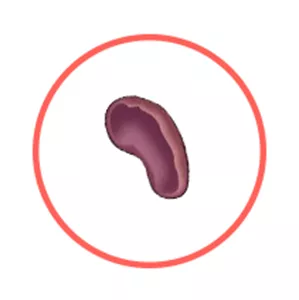
The Spleen is a so-called "Zang" Organ. Learn more about the Spleen in Chinese Medicine
Spleen Deficiency with Dampness
Recommended herbal formula: Wu Ling San
Symptoms: Edema Diarrhea Urinary difficulty General sensation of heaviness
Congestive heart failure might be due to Spleen Deficiency with Dampness if the condition is paired with typical pattern symptoms such as edema, general sensation of heaviness, diarrhea and urinary difficulty.

The Triple Burner is a so-called "Fu" Organ. Learn more about the Triple Burner in Chinese Medicine
Phlegm in the Lower Burner
Recommended herbal formula: Wu Ling San
Symptoms: Vertigo Coughing Shortness of breath Vomiting frothy saliva Throbbing pulsations just below the umbilicus
Congestive heart failure might be due to Phlegm in the Lower Burner if the condition is paired with typical pattern symptoms such as throbbing pulsations just below the umbilicus, vomiting frothy saliva, vertigo and shortness of breath.

The Spleen is a so-called "Zang" Organ. Learn more about the Spleen in Chinese Medicine
Spleen or Kidney Yang Deficiency
Pulse type(s): Deep (Chen), Fine (Xi)
Tongue color: Pale
Tongue shape: Swollen, Tooth-marked
Recommended herbal formula: Zhen Wu Tang
Symptoms: Edema Coughing Vomiting Dizziness Loose stools Palpitations Urinary difficulty Heavy sensation in the head Abdominal pain that worsens with cold Deep aching and heaviness in the extremities
Congestive heart failure might be due to Spleen or Kidney Yang Deficiency if the condition is paired with typical pattern symptoms such as abdominal pain that worsens with cold, urinary difficulty, deep aching and heaviness in the extremities and dizziness. Similarly, patients with Spleen or Kidney Yang Deficiency typically exhibit deep (Chen) or fine (Xi) pulses as well as a pale tongue.

Prepared Aconite (Zhi Fu Zi) is the key herb for Zhen Wu Tang, a formula used for Exterior Cold invading the Interior
Exterior Cold invading the Interior
Pulse type(s): Deep (Chen), Fine (Xi)
Tongue coating: Thin white coating
Recommended herbal formula: Zhen Wu Tang
Symptoms: Dizziness Unsteadiness Generalized twitching Palpitations in the epigastrium Sweating that doesn't reduce fever
Congestive heart failure might be due to Exterior Cold invading the Interior if the condition is paired with typical pattern symptoms such as sweating that doesn't reduce fever, palpitations in the epigastrium, dizziness and generalized twitching. Similarly, patients with Exterior Cold invading the Interior typically exhibit deep (Chen) or fine (Xi) pulses as well as a tongue with thin white coating.

The Spleen is a so-called "Zang" Organ. Learn more about the Spleen in Chinese Medicine
Spleen Yang Deficiency
Pulse type(s): Deep (Chen), Slow (Chi), Weak (Ruo)
Tongue color: Pale
Recommended herbal formulas: Zhen Wu Tang Bu Zhong Yi Qi Tang, Yi Huang Tang, Huang Tu Tang, Wen Pi Tang, Zhen Wu Tang
Symptoms: Gas Edema Chills Fatigue Bloating Lassitude Cold limbs Weak Limbs Loose stools Poor appetite Pale complexion Feeling of cold Vagina discharge Sallow complexion Desire to lie down curled up Undigested food in the stools Slight abdominal distension after eating Abdominal pain and distension relieved by pressure and warmth
Generally speaking, Spleen Yang Deficiency often develops from Spleen Qi Deficiency, but it is more extensive and severe. The common manifestations are these related to digestive functions such as loose stools, poor appetite, slight abdominal distension and pain after eating, gas and bloating. Since the Spleen fails to transport the Food Qi to the body, patients also suffer from general fatigue, lassitude, weak limbs, pale tongue and face. Patients prefers to lie down.
On top of above, the Yang Deficiency also brings in additional Cold symptoms, such as a cold feeling and cold limbs. It is because Spleen Yang fails to warm the body and Organs. Therefore, the body metabolism get slower and some food are not digested properly and passes directly into the stools.
Since the Spleen fails to perform the function of transforming and transporting fluids, the circulation of Body Fluids is disturbed, causing symptoms such as Oedema, vaginal discharge and Lung mucus. The Yang Deficiency pattern is even more likely to form Dampness and Phlegm.

Prepared Aconite (Zhi Fu Zi) is the key herb for Fu Zi Tang, a formula used for Yang Deficiency with Cold-Damp
Yang Deficiency with Cold-Damp
Pulse type(s): Choppy (Se), Deep (Chen), Minute (Wei), Slow (Chi)
Tongue coating: Thin white coating
Recommended herbal formula: Fu Zi Tang
Symptoms: No thirst Cold extremities Generalized body pain Aching bones and joints Aversion to cold - especially at the back
Congestive heart failure might be due to Yang Deficiency with Cold-Damp if the condition is paired with typical pattern symptoms such as generalized body pain, aching bones and joints, cold extremities and no thirst. Similarly, patients with Yang Deficiency with Cold-Damp typically exhibit choppy (Se), deep (Chen), minute (Wei) or slow (Chi) pulses as well as a tongue with thin white coating.
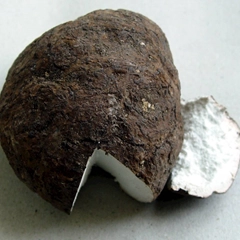
Poria-Cocos Mushrooms (Fu Ling) is the key herb for Wu Pi Yin, a formula used for Oedema
Oedema
Pulse type(s): Hidden (Fu), Slowed-down (Huan)
Tongue coating: Thick white coating
Recommended herbal formula: Wu Pi Yin
Symptoms: Labored breathing Urinary difficulty General sensation of heaviness distention and fullness
Congestive heart failure might be due to Oedema if the condition is paired with typical pattern symptoms such as labored breathing, urinary difficulty and general sensation of heaviness distention and fullness. Similarly, patients with Oedema typically exhibit hidden (Fu) or slowed-down (Huan) pulses as well as a tongue with thick white coating.

The Spleen is a so-called "Zang" Organ. Learn more about the Spleen in Chinese Medicine
Heart and Spleen Deficiency
Pulse type(s): Fine (Xi)
Tongue coating: Thin white coating
Tongue color: Pale
Recommended herbal formula: Gui Pi Tang
Symptoms: Fatigue Anxiety Insomnia Menorrhagia Palpitations Forgetfulness Poor appetite Pale complexion Abnormal uterine bleeding
Congestive heart failure might be due to Heart and Spleen Deficiency if the condition is paired with typical pattern symptoms such as forgetfulness, palpitations, insomnia and fatigue. Similarly, patients with Heart and Spleen Deficiency typically exhibit fine (Xi) pulses as well as a pale tongue with thin white coating.
The five herbal formulas that might help with congestive heart failure

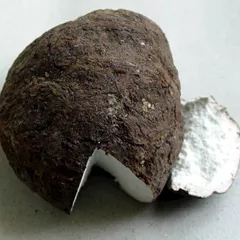
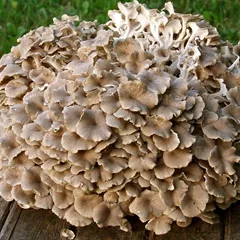
The top herbs in Wu Ling San are Water Plantain (Ze Xie), Poria-Cocos Mushrooms (Fu Ling) and Polyporus (Zhu Ling)
Wu Ling San
Source date: 220 AD
Number of ingredients: 5 herbs
Key actions: Promotes urination,. Warms the Yang. Strengthens the Spleen. Promotes Qi transformation function. Drains Dampness. Clears edema.
Why might Wu Ling San help with congestive heart failure?
Because it is a formula often recommended to help with the patterns Phlegm, Spleen Deficiency with Dampness and Phlegm in the Lower Burner which are sometimes associated with congestive heart failure. If any of these patterns look like something you might suffer from, this formula might help (although please seek confirmation with a professional practitioner beforehand).

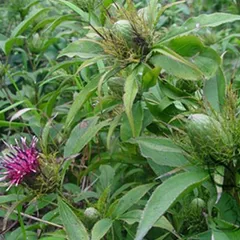

The top herbs in Zhen Wu Tang are Prepared Aconite (Zhi Fu Zi), Atractylodes Rhizomes (Bai Zhu) and Poria-Cocos Mushrooms (Fu Ling)
Zhen Wu Tang
Source date: 220 AD
Number of ingredients: 5 herbs
Key actions: Warms and tonifies the Yang and Qi of the Spleen and Kidneys. Eliminates Dampness.
Why might Zhen Wu Tang help with congestive heart failure?
Because it is a formula often recommended to help with the patterns Spleen or Kidney Yang Deficiency, Exterior Cold invading the Interior and Spleen Yang Deficiency which are sometimes associated with congestive heart failure. If any of these patterns look like something you might suffer from, this formula might help (although please seek confirmation with a professional practitioner beforehand).



The top herbs in Fu Zi Tang are Prepared Aconite (Zhi Fu Zi), Atractylodes Rhizomes (Bai Zhu) and Poria-Cocos Mushrooms (Fu Ling)
Fu Zi Tang
Source date: 220 AD
Number of ingredients: 5 herbs
Key actions: Warms the Meridians. Assists the Yang. Dispels Cold. Transforms Dampness.
Why might Fu Zi Tang help with congestive heart failure?
Because it is a formula often recommended to help treat Yang Deficiency with Cold-Damp, a pattern sometimes associated with congestive heart failure. If it looks like you might suffer from Yang Deficiency with Cold-Damp, this formula might help (although please seek confirmation with a professional practitioner beforehand).

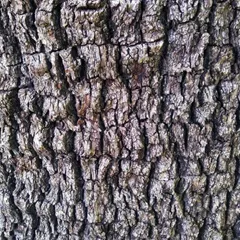

The top herbs in Wu Pi Yin are Poria-Cocos Mushrooms (Fu Ling), Mulberry Bark (Sang Bai Pi) and Ginger Peel (Sheng Jiang Pi)
Wu Pi Yin
Source date: 1107 AD
Number of ingredients: 5 herbs
Key actions: Reduces edema, diuretic. Regulates and strengthens Spleen Qi.
Why might Wu Pi Yin help with congestive heart failure?
Because it is a formula often recommended to help treat Oedema, a pattern sometimes associated with congestive heart failure. If it looks like you might suffer from Oedema, this formula might help (although please seek confirmation with a professional practitioner beforehand).



The top herbs in Gui Pi Tang are Ginseng (Ren Shen), Milkvetch Roots (Huang Qi) and Atractylodes Rhizomes (Bai Zhu)
Gui Pi Tang
Source date: 1529 AD
Number of ingredients: 12 herbs
Key actions: Tonifies and nourish Qi and Blood. Tonifies Heart and Spleen.
Why might Gui Pi Tang help with congestive heart failure?
Because it is a formula often recommended to help treat Heart and Spleen Deficiency, a pattern sometimes associated with congestive heart failure. If it looks like you might suffer from Heart and Spleen Deficiency, this formula might help (although please seek confirmation with a professional practitioner beforehand).
Symptoms related to congestive heart failure
Dizziness Edema Urinary difficulty Coughing Loose stools Palpitations Pale complexion Poor appetite Fatigue Feeling of oppression of the chest

